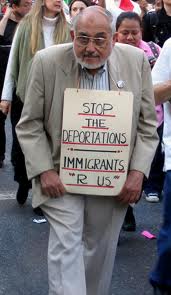 What happens if you get wrongfully deported from the United States while you are the legal guardian of a child lawfully living in the United States? Today we are going to discuss a real life case and what the implications mean for you.
What happens if you get wrongfully deported from the United States while you are the legal guardian of a child lawfully living in the United States? Today we are going to discuss a real life case and what the implications mean for you.
In the immigration case Macario Moreno-Morante v. Alberto R. Gonzales, a U.S. Court addressed the following question: Can a non-citizen grandparent (“Mr. Macario”) be considered a “qualifying relative” in order to be eligible to cancel his deportation (formally known as cancellation of removal), because the grandparent is the legal guardian/custodian of his grandchild (who is a United States citizen?)
The court addressed this question because the Bureau of Immigration Appeals (“BIA”) denied Mr. Macario’s application to cancel his deportation (formally known as an application for cancellation of removal): the BIA agreed with an Immigration Judge that Mr. Macario’s grandchild was not his child within the meaning of relevant deportation law. The BIA made that decision regardless of the fact that Mr. Macario was his grandchild’s legal guardian/custodian and was in the process of adopting his grandchild. Importantly, no one disputed the fact that for all purposes, Mr. Macario provided for his grandchild as if his grandchild were his own child.
First, let’s lay out the law that applies to this discussion: The law states: “to be eligible for cancellation of removal (deportation), a nonpermanent resident (Mr. Macario) must establish, amongst other things, that “removal would result in exceptional and extremely unusual hardship to the aliens spouse, parent, or child who is a citizen of the United States or an alien lawfully admitted for permanent residence.” That means that Mr. Macario must show that his removal (deportation) would result in exceptional and extremely unusual hardship to his grandchild, who Mr. Macario has legal custody of.
However, the court never addressed whether or not deporting Mr. Macario would result in exceptional and extremely unusual hardship to his grandchild who he had legal guardianship of, because the court found that Mr. Macario was not a qualifying relative of the child to begin with.
The problem for the Court seemed to be that at the time of Mr. Macario challenged his deportation, he had not formally adopted his grandchild. So the Court stated that the obvious fact that the Mr. Macario acted as the child’s parent was not enough. Rather, Mr. Macario had to be the legal parent of the child. What does that mean? Simply put, being the legal guardian and custodian of a child is not enough to submit a successful application to cancel your deportation, even though it may be obvious that if you leave the country, the “child” will suffer.
In fairness, the Court recognized the harsh and unfair consequences of its ruling. However, the Court said it did not have the power to change what Congress intended; in order to qualify for hardship to be suffered by a child, that child must meet the detailed and clear definition of a child in accordance with immigration laws. The sad reality is that being a legal guardian/custodian is not enough to meet that definition.
Importantly, the Court also sent a clear message to Congress that Congress has the authority to undue the harsh reality of these types of situations, by reforming the definition of “child” found in immigration laws. To date, Congress, unfortunately, has done nothing.
Challenging deportation requires you to find a good lawyer because the process is long and can be tricky.
Contact Williams Oinonen LLC to help you with your deportation issues. We help serve the entire immigrant community, including those from Russia, Mexico, Egypt, Peru, Honduras, Central America, South America, Europe, Africa, India, and Asia.
 Georgia Injury Lawyer Blog
Georgia Injury Lawyer Blog

